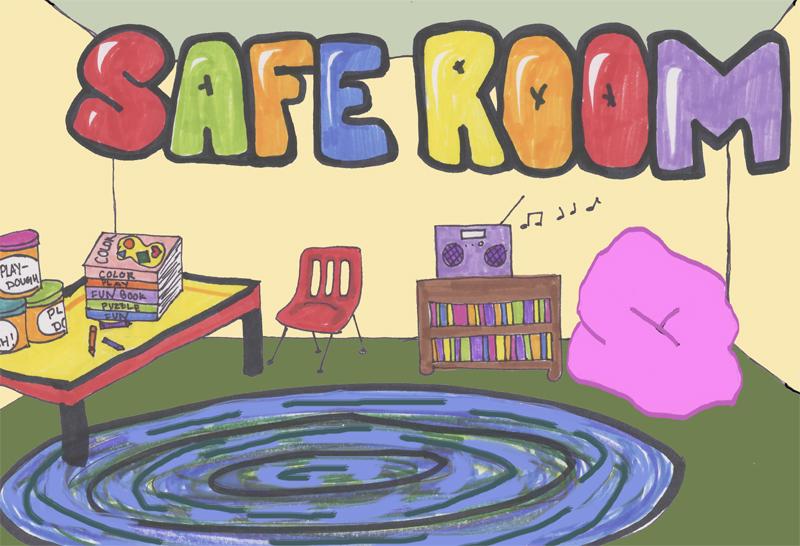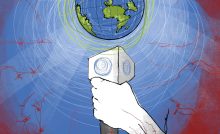

Aby Sobotka-Briner | Staff Illustrator
I’m a millennial college student. I have a “Kick me” sign on my back that tells the world I’m emotional, sensitive and cannot take criticism.
Before arriving at college, I couldn’t understand why society was cramming me into this box and resented the notion outright. Sadly, there were only so many “problematic ideas” and “safe spaces” that I could take before I grimly accepted the horrible truth about my generation — we cannot handle disagreement from others. It scares us.
This sort of intellectual bullying and censorship is not how you broaden a student’s mind. Action like this amounts to nothing more than an echo chamber of ideas that doesn’t advance anybody’s education.
Several weeks ago, the Wesleyan University student government voted to slash funding to the school’s newspaper, The Wesleyan Argus, citing a petition 172 students signed.
The petition followed backlash over an op-ed written on Sept. 14, questioning the effectiveness of the Black Lives Matter movement. The editorial board published an editorial apologizing for carelessness in fact-checking incorrect stastitics, and failing to balance the piece with a counterargument.
The petition demanded, along with the defunding of the paper, that all publications at Wesleyan undergo “Social Justice/Diversity Training” once every semester. The student government saw fit to cut the funding of the newspaper in half because of the petition, and the Argus is currently determining whether it can continue to print two editions a week.
Fact-checking issues aside, students and school officials should not blankly oppose controversial opinions — this resistance only serves to snuff out a platform for student voices.
Jonathan R. Cole’s biography of the American university system, “The Great American University,” shows readers how administrators held American universities up as think tanks of academia, proverbial melting pots of ideas and worldviews. The book determines that most Americans overlook how universities create and transmit knowledge.
As alumni Woodrow Wilson said to the founding president of Johns Hopkins, Daniel Gilman, on the 25th anniversary of the university in 1901, American universities had developed “a new and higher university ideal.”
In modern American colleges, we have a plethora of trigger warnings and the seemingly inescapable demand of universities to “provide a safe space for students.” In seeking safety, we cannot disable discourse and challenging debate, even if this discourse makes us question our own convictions.
At Brown University, before a student debate on the existence of rape culture on college campuses, a student named Katherine Byron demanded that administrators create an alternative talk, sheduled at the same time as the debate, on the role of culture in sexual assault.
Students set up a “safe space” to allow anyone any who might find the contents of the debate troubling or invalidating to seal themselves away from the opposing viewpoint.
In a New York Times article, Judith Shulevitz reports, “The room was equipped with cookies, coloring books, bubbles, Play-Doh, calming music, pillows, blankets and a video of frolicking puppies, as well as students and staff members trained to deal with trauma.”
Some may argue that these accommodations are necessary for students who have suffered traumatic events and may be susceptible to PTSD flashbacks. But the key issue with this idea of “protecting” students is that it does not accurately represent the real world outside of university.
You are paying to learn and mature — to become an adult in the real world. Adults have to live with the knowledge that some people disagree with them on politics, believe in a different god, have different world views and sometimes do terrible things. The world hides nothing. You will always come into contact with upsetting or conflicting ideas, images and thoughts.
Regardless of your beliefs, I think it goes without saying that the censoring of unpopular opinions is a hallmark of backward or repressive groups.
When a community intentionally censors or disregards outside opinions, it relinquishes its ability to grow and expand its perspective. At Pitt, we value our diversity of opinion and learn from one another every day. This campus has clubs, lectures and guest speakers that appeal to a sweeping range of viewpoints — from those of Libertarians to the Marxists. You can almost certainly find one that you fit into, and if you can’t, you have every opportunity to make one yourself.
It is up to each of us to maintain this diversity of opinion. Don’t seek to silence opposition — embrace and clash with it. Test the merits of your own ideas, and in turn, test the merits of others.
As far as your beliefs and personal convictions go, college should be the least safe place on Earth.
Email Timothy at thn17@pitt.edu.
Recent Posts
Review | Delayed checkouts at ‘The White Lotus’: An unoriginal third season
(Contains Spoilers) There is no meditation class, no reiki session, no nutritionally balanced, organic food…
Celebrating Women’s History Month with the HerStory Slam Event
Idaya Sasikumar, a first-year psychology student, took to the stage to read her personal story.…
Review | Michael Franti & Spearhead reflect on the power of love in new album ‘Welcome to the Family’
Nothing says “Welcome to the family!” like a new baby. Soul-rock band Michael Franti &…
How hurling put me on ESPN and in a National Championship game
Nothing is more difficult than joining a new club in college. It is terrifying when…
Column | It’s now or never for Henry Davis
When Henry Davis came into Monday night’s game against the Washington Nationals at PNC Park,…
Pitt men’s basketball navigating transfer portal difficulties
Pitt men’s basketball is like any other team in the world of large NIL deals…


